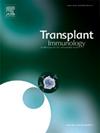Efficacy of waitlist desensitization for lung candidates is limited by antibody rebound
IF 1.4
4区 医学
Q4 IMMUNOLOGY
引用次数: 0
Abstract
HLA antibodies remain a barrier to lung transplantation due to the risk of antibody-mediated rejection (AMR). Desensitization is an option to lower antibody levels and increase access to transplant by reducing risk of AMR. However, concerns remain regarding the efficacy, durability, and risks of administering this treatment while waiting for deceased donor offers. We performed longitudinal antibody assessments for 15 highly sensitized lung candidates undergoing desensitization with plasmapheresis-based treatment protocols. Of the 14 patients transplanted, a significant decrease in overall antibody level was observed in the 2 of 4 patients transplanted within 15 days of the end of their first treatment. Conversely, of the 10 who were transplanted more than 15 days after first treatment, 7 patients rebounded to pre-treatment levels or higher within 3–4 weeks. For the 3 patients in this group who showed a durable decrease, this effect did not manifest until months following treatment. When comparing outcomes for the desensitization cohort against a control group that received treatment post-transplant, no significant differences in survival or acute rejection were observed. These results demonstrate that while plasmapheresis-based waitlist desensitization can effectively remove or reduce the level of HLA antibodies, rebound limits its effectiveness for most patients. To promote successful outcomes, pre-transplant therapy should be targeted to candidates with high lung composite allocation scores likely to be transplanted within the first week after treatment, while aggressive post-transplant immunosuppression may be a safer approach for most highly sensitized patients.
候补名单脱敏对肺部候选人的效果受到抗体反弹的限制。
由于存在抗体介导的排斥反应(AMR)的风险,HLA抗体仍然是肺移植的一个障碍。脱敏是降低抗体水平和通过减少抗菌素耐药性风险增加移植机会的一种选择。然而,在等待已故供体提供时,对这种治疗的有效性、持久性和风险的担忧仍然存在。我们对15名高度致敏的肺候选者进行了纵向抗体评估,这些候选者接受了基于血浆置换的脱敏治疗方案。在14例移植患者中,在第一次治疗结束后15 天内移植的4例患者中,有2例患者的总抗体水平显著下降。相反,在第一次治疗后超过15 天移植的10例患者中,有7例患者在3-4 周内恢复到治疗前水平或更高。对于该组中表现出持久下降的3例患者,这种效果直到治疗后数月才显现。当将脱敏组与移植后接受治疗的对照组的结果进行比较时,没有观察到生存或急性排斥反应的显著差异。这些结果表明,虽然基于血浆置换的候补名单脱敏可以有效地去除或降低HLA抗体水平,但反弹限制了其对大多数患者的有效性。为了促进成功的结果,移植前治疗应针对治疗后第一周内可能移植的肺复合分配评分较高的候选人,而积极的移植后免疫抑制可能是大多数高度敏感患者更安全的方法。
本文章由计算机程序翻译,如有差异,请以英文原文为准。
求助全文
约1分钟内获得全文
求助全文
来源期刊

Transplant immunology
医学-免疫学
CiteScore
2.10
自引率
13.30%
发文量
198
审稿时长
48 days
期刊介绍:
Transplant Immunology will publish up-to-date information on all aspects of the broad field it encompasses. The journal will be directed at (basic) scientists, tissue typers, transplant physicians and surgeons, and research and data on all immunological aspects of organ-, tissue- and (haematopoietic) stem cell transplantation are of potential interest to the readers of Transplant Immunology. Original papers, Review articles and Hypotheses will be considered for publication and submitted manuscripts will be rapidly peer-reviewed and published. They will be judged on the basis of scientific merit, originality, timeliness and quality.
 求助内容:
求助内容: 应助结果提醒方式:
应助结果提醒方式:


